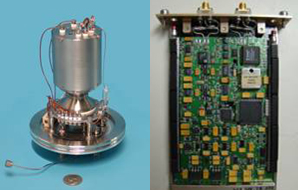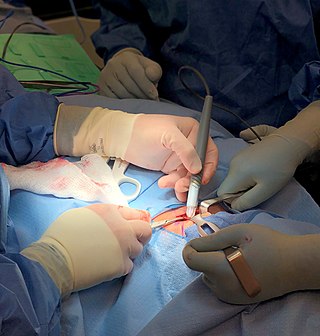Related Research Articles

An ion source is a device that creates atomic and molecular ions. Ion sources are used to form ions for mass spectrometers, optical emission spectrometers, particle accelerators, ion implanters and ion engines.

Carolyn Ruth Bertozzi is an American chemist and Nobel laureate, known for her wide-ranging work spanning both chemistry and biology. She coined the term "bioorthogonal chemistry" for chemical reactions compatible with living systems. Her recent efforts include synthesis of chemical tools to study cell surface sugars called glycans and how they affect diseases such as cancer, inflammation, and viral infections like COVID-19. At Stanford University, she holds the Anne T. and Robert M. Bass Professorship in the School of Humanities and Sciences. Bertozzi is also an Investigator at the Howard Hughes Medical Institute (HHMI) and is the former director of the Molecular Foundry, a nanoscience research center at Lawrence Berkeley National Laboratory.
In mass spectrometry, direct analysis in real time (DART) is an ion source that produces electronically or vibronically excited-state species from gases such as helium, argon, or nitrogen that ionize atmospheric molecules or dopant molecules. The ions generated from atmospheric or dopant molecules undergo ion-molecule reactions with the sample molecules to produce analyte ions. Analytes with low ionization energy may be ionized directly. The DART ionization process can produce positive or negative ions depending on the potential applied to the exit electrode.
Surface-enhanced laser desorption/ionization (SELDI) is a soft ionization method in mass spectrometry (MS) used for the analysis of protein mixtures. It is a variation of matrix-assisted laser desorption/ionization (MALDI). In MALDI, the sample is mixed with a matrix material and applied to a metal plate before irradiation by a laser, whereas in SELDI, proteins of interest in a sample become bound to a surface before MS analysis. The sample surface is a key component in the purification, desorption, and ionization of the sample. SELDI is typically used with time-of-flight (TOF) mass spectrometers and is used to detect proteins in tissue samples, blood, urine, or other clinical samples, however, SELDI technology can potentially be used in any application by simply modifying the sample surface.

The International Mass Spectrometry Foundation (IMSF) is a non-profit scientific organization in the field of mass spectrometry. It operates the International Mass Spectrometry Society, which consists of 37 member societies and sponsors the International Mass Spectrometry Conference that is held once every two years.
Mass spectrometry imaging (MSI) is a technique used in mass spectrometry to visualize the spatial distribution of molecules, as biomarkers, metabolites, peptides or proteins by their molecular masses. After collecting a mass spectrum at one spot, the sample is moved to reach another region, and so on, until the entire sample is scanned. By choosing a peak in the resulting spectra that corresponds to the compound of interest, the MS data is used to map its distribution across the sample. This results in pictures of the spatially resolved distribution of a compound pixel by pixel. Each data set contains a veritable gallery of pictures because any peak in each spectrum can be spatially mapped. Despite the fact that MSI has been generally considered a qualitative method, the signal generated by this technique is proportional to the relative abundance of the analyte. Therefore, quantification is possible, when its challenges are overcome. Although widely used traditional methodologies like radiochemistry and immunohistochemistry achieve the same goal as MSI, they are limited in their abilities to analyze multiple samples at once, and can prove to be lacking if researchers do not have prior knowledge of the samples being studied. Most common ionization technologies in the field of MSI are DESI imaging, MALDI imaging and secondary ion mass spectrometry imaging.
Robert Graham Cooks is the Henry Bohn Hass Distinguished Professor of Chemistry in the Aston Laboratories for Mass Spectrometry at Purdue University. He is an ISI Highly Cited Chemist, with over 1,000 publications and an H-index of 144.

Ambient ionization is a form of ionization in which ions are formed in an ion source outside the mass spectrometer without sample preparation or separation. Ions can be formed by extraction into charged electrospray droplets, thermally desorbed and ionized by chemical ionization, or laser desorbed or ablated and post-ionized before they enter the mass spectrometer.

Proteogenomics is a field of biological research that utilizes a combination of proteomics, genomics, and transcriptomics to aid in the discovery and identification of peptides. Proteogenomics is used to identify new peptides by comparing MS/MS spectra against a protein database that has been derived from genomic and transcriptomic information. Proteogenomics often refers to studies that use proteomic information, often derived from mass spectrometry, to improve gene annotations. The utilization of both proteomics and genomics data alongside advances in the availability and power of spectrographic and chromatographic technology led to the emergence of proteogenomics as its own field in 2004.
Richard Dale Smith is a chemist and a Battelle Fellow and chief scientist within the biological sciences division, as well as the director of proteomics research at the Pacific Northwest National Laboratory (PNNL). Smith is also director of the NIH Proteomics Research Resource for Integrative Biology, an adjunct faculty member in the chemistry departments at Washington State University and the University of Utah, and an affiliate faculty member at the University of Idaho and the Department of Molecular Microbiology & Immunology, Oregon Health & Science University. He is the author or co-author of approximately 1100 peer-reviewed publications and has been awarded 70 US patents.

An onkoknife, iKnife, or intelligent scalpel is a surgical knife that tests tissue as it contacts it during an operation and immediately gives information as to whether that tissue contains cancer cells. During a surgery this information is given continuously to the surgeon, significantly accelerating biological tissue analysis and enabling identification and removal of cancer cells. Electroknives have been in use since the 1920s and smart knife surgery is not limited only to cancer detection. In clinical studies the iKnife has shown impressive diagnostic accuracy - distinguishing benign ovarian tissue from cancerous tissue, breast tumour from normal breast tissue and recognises histological features of poor prognostic outcome in colorectal carcinoma. Furthermore, the technology behind iKnife - rapid evaporative ionisation mass spectrometry (REIMS) - can identify Candida yeasts down to species level.

A miniature mass spectrometer (MMS) is a type of mass spectrometer (MS) which has small size and weight and can be understood as a portable or handheld device. Current lab-scale mass spectrometers however, usually weigh hundreds of pounds and can cost on the range from thousands to millions of dollars. One purpose of producing MMS is for in situ analysis. This in situ analysis can lead to much simpler mass spectrometer operation such that non-technical personnel like physicians at the bedside, firefighters in a burning factory, food safety inspectors in a warehouse, or airport security at airport checkpoints, etc. can analyze samples themselves saving the time, effort, and cost of having the sample run by a trained MS technician offsite. Although, reducing the size of MS can lead to a poorer performance of the instrument versus current analytical laboratory standards, MMS is designed to maintain sufficient resolutions, detection limits, accuracy, and especially the capability of automatic operation. These features are necessary for the specific in-situ applications of MMS mentioned above.

Marcos Nogueira Eberlin is a Brazilian chemist and former professor at the Institute of Chemistry of the University of Campinas. He is a member of the Brazilian Academy of Sciences and received the Brazilian National Order of Scientific Merit in 2005 and the Thomson Medal in 2016.
Jennifer S. Brodbelt is an American chemist known for her research using mass spectrometry to characterize organic compounds, especially biopolymers and proteins.

The MasSpec Pen, or the precìso MasSpec Pen System, is a mass spectrometry (MS) based cancer detection and diagnosis system that can be used for ex vivo and in vivo tissue sample analysis. The system collects biological molecules from a tissue sample surface via a solid-liquid extraction mechanism and transports the molecules to a mass spectrometer for analysis. The composition of the extracted molecules can then be used to predict if the tissue sample analyzed contains cancerous cells using machine learning algorithms and statistical models. In early-stage clinical research, the MasSpec Pen system was able to distinguish various cancer tissues, including thyroid, breast, lung, and ovarian tumor tissues, from their normal counterparts with an overall accuracy of 96.3%. A follow-up study in illustrating the use of the device for detection of serous ovarian carcinoma in ex vivo tissue biopsies allowed for the discrimination of normal and cancerous ovarian samples with a clinical sensitivity and specificity of 94.0% and 94.4%, respectively.
Peter Nemes is a Hungarian-American chemist, who is active in the fields of bioanalytical chemistry, mass spectrometry, cell/developmental biology, neuroscience, and biochemistry.
The Cancer Prevention and Research Institute of Texas (CPRIT) is a state agency that funds cancer research in Texas. It is funded by bonds issued by the state of Texas. Researchers and organizations in Texas are invited to apply for grants that match CPRIT's mission and goals.
Abraham Badu-Tawiah is a Ghanaian scientist who is an Associate Professor of Chemistry at the Ohio State University. His research considers the development of mass spectrometry for the detection of disease. In 2017 he was awarded the American Chemical Society Arthur F. Findeis prize and in 2020 a Sloan Research Fellowship.
Ying Ge is a Chinese-American biologist who is a Professor of Cell and Regenerative Biology at the University of Wisconsin–Madison. Her research considers the molecular mechanisms that underpin cardiac disease. She has previously served on the board of directors of the American Society for Mass Spectrometry. In 2020 Ge was named on the Analytical Scientist Power List.
Erin Shammel Baker is an American bioanalytical chemist specializing in developing ion mobility-mass spectrometry hybrid instruments for biological and environmental applications. Baker is an expert in the research of perfluoroalkyl and polyfluoroalkyl substances analysis.
References
- 1 2 Livia S. Eberlin, MacArthur Foundation, retrieved 2018-10-04
- 1 2 Wyllie, Julian (October 4, 2018), "Meet the Academics Who Nabbed This Year's MacArthur 'Genius' Grants", The Chronicle of Higher Education
- 1 2 3 Bradley, David (2010), "Counterfeit Spectroscopy", ChemViews Magazine, ChemPubSoc Europe, doi:10.1002/chemv.201000020
- 1 2 3 "About Livia", Livia S. Eberlin Research Group, University of Texas at Austin, retrieved 2018-10-04
- ↑ Eberlin, Livia S. (2012), "Developments in ambient mass spectrometry imaging and its applications in biomedical research and cancer diagnosis", Purdue e-Pubs, Purdue University, pp. 1–279, retrieved 2018-10-04
- ↑ Petrova, Magdalena (March 22, 2018), This 3-D printed pen lets surgeons detect cancer in 10 seconds, CNBC
- ↑ "New UT test detects cancer in hours; decreases need for surgery". KXAN.com. 2019-10-07. Retrieved 2019-10-08.
- ↑ "Dr. Livia S. Eberlin: "I Always Thought the Word 'Genius' Sounded Funny. How Can You Really Define What's Genius?"". Texas Monthly. 2018-10-16. Retrieved 2019-10-08.
- ↑ "30 Under 30". Forbes. 2015. Archived from the original on January 6, 2015. Retrieved 8 October 2019.
- ↑ AAAS Marion Milligan Mason Award Recipients, American Association for the Advancement of Science , retrieved 2018-10-04
- ↑ "UT chemist Livia S. Eberlin wins MacArthur 'genius' grant". Statesman. Retrieved 8 October 2019.
- ↑ Haurwitz, Ralph K. M. "UT chemist Livia S. Eberlin wins MacArthur 'genius' grant". Austin American-Statesman. Retrieved 2019-10-08.
- ↑ "UT Austin Chemist Livia Eberlin Named a Moore Inventor Fellow".
- ↑ "The Power List 2014". The Analytical Scientist. Retrieved 2022-12-16.
- ↑ "The Power List 2018". The Analytical Scientist. Retrieved 2022-12-16.
- ↑ "The Power List 2019". The Analytical Scientist. Retrieved 2022-12-16.
- ↑ "The Power List 2021". The Analytical Scientist. Retrieved 2022-12-16.
- ↑ "The Power List 2022". The Analytical Scientist. Retrieved 2022-12-16.
- ↑ "The Power List 2023". The Analytical Scientist. 2023-09-10. Retrieved 2023-09-02.